Steve Flowers: Congressional lines and Congressmen will remain the same

For several years leading up to the 2010 Census count, the national projections were that Alabama would lose one of our seven congressional districts and drop to six. When the count was taken, we surprised ourselves and the nation and kept our seven seats in the United States Congress. Therefore, the legislature’s task in drawing our seven congressional districts was relatively easy. Except for some tweaking here and there due to growth in Madison, Limestone, Lee, Shelby, and especially Baldwin counties, and the loss of population in the Black Belt, our congressional district lines were kept basically the same as they have been for the past few decades. We essentially have six of our seven districts that are safe Republican seats. We have one dedicated majority minority African American Democratic Congressional District. That Democratic seat is held by Congresswoman Terri Sewell. She has been in that seat for over a decade and has become a respected leader in the Democratic House leadership. The Democrats are in the majority, which makes her a powerful member of the House. However, most political experts and polling indicate that this year’s election will bring a swing of 30 or more Republican seat pickups or takeovers, thus making the Republicans the majority party. This will be beneficial for Alabama since six of our seven seats are held by Republicans. It will be particularly beneficial to folks in the fourth district, who have Robert Aderholt (R-Haleyville) as their Congressman. Aderholt is the most senior member of our delegation and is the ranking Republican on the House Appropriation Committee. Congressman Mike Rogers (R-Anniston) is also gaining ground in seniority. He is a ranking member of the Armed Services Committee. Congressman Gary Palmer (R-Jefferson) represents the suburban areas of metro-Jefferson, Hoover, and Shelby. It is considered one of the most Republican House districts in America. We have two freshmen Republican Congressmen who are finishing their first two years in the House. Jerry Carl (R-Mobile) represents the coastal first district of basically Mobile and Baldwin Counties. He has taken to Congress like a duck to water. Barry Moore (R-Enterprise) represents the second district made up of the Wiregrass and the fast-growing Pike Road area of Montgomery, as well as the populous counties of Autauga and Elmore. All six of the aforementioned incumbents will be reelected without opposition. The only excitement in Congressional politics in the Heart of Dixie will play out in the fifth district. This Huntsville-Tennessee Valley seat is currently held by Mo Brooks, who has opted to run for the U.S. Senate, thus leaving a seldom seen open congressional seat contest. There are six Republicans vying for this open fifth district seat. The contestants are Dale Strong, Paul Sanford, Casey Wardynski, Harrison Wright, Andy Blalock, and John Roberts. Madison County Commission Chairman Dale Strong appears to be the strongest candidate. He is far outdistancing the field in polling and fundraising. Some say that he could eclipse the field without a runoff. The most ardent challengers will be former State Senator Paul Sanford and former Huntsville City School Superintendent Casey Wardynski. Dr. Wardynski has done a good job fundraising. There will be a large turnout in this congressional race. In fact, this Huntsville-Madison-Limestone Tennessee Valley area of the state will more than likely have the largest percentage turnout in the state. Not only is there an open congressional seat, but Mo Brooks is the local candidate for the open U.S. Senate Seat, and popular, incumbent Republican state school board member, Wayne Reynolds, will also be on the ballot with token opposition. In addition, the only hotly contested Republican State Senate race between Tom Butler and Bill Holtzclaw is in the Madison-Limestone area. There are also three open hotly contested State House races, including filling the seats of Speaker Mac McCutcheon and veteran House member Howard Sanderford. There is also a hotly contested open sheriff’s race in Limestone County. Furthermore, the phantom candidate for the U.S. Senate, Mike Durant, claims Huntsville as his home. All of these ingredients are a recipe for a larger turnout in the Tennessee Valley than the rest of the state on May 24. The Congressional lines and six of seven congressmen will remain the same for this 2022 election cycle. However, hold the phone. The federal courts could change that for 2024. See you next week. Steve Flowers is Alabama’s leading political columnist. His weekly column appears in over 60 Alabama newspapers. Steve served 16 years in the state legislature. Steve may be reached at: www.steveflowers.us.
Alabama House committee advances lottery bill

An Alabama legislative committee advanced a lottery proposal Thursday as proponents try to get the issue before voters for the first time since 1999. The House Tourism and Economic Development Committee approved the proposed constitutional amendment and related enabling legislation. The bills now move to the full House of Representatives. Alabama is one of five states without a state lottery. Republican Rep. Chip Brown, the bill’s sponsor, said it is the top issue he and other lawmakers get asked about in their districts. He said many Alabamians now drive across state lines to buy tickets. “The people of Alabama have been playing the lottery for years. We’ve just been playing it in other states. So it’s time we kept that money in-state and helped out the children of the state of Alabama,” Brown told reporters. The measure faces a short window to win final approval with just seven meeting days remaining in the legislative session. Brown said he hoped for a vote in the final week of March when lawmakers return from spring break. House Speaker Mac McCutcheon said he first wants assurances that supporters have the needed 63 votes for passage before bogging down one of the final legislative days with the lengthy debate. He asked members to spend spring break talking with constituents and colleagues to determine the level of support. “We’ve got to see where the votes are,” McCutcheon said. Lottery proceeds would be used primarily to provide scholarships to help families pay a portion of tuition at two and four-year colleges. The two-year scholarships would be capped at $2,500 or less. The amount of the four-year scholarships would be determined based on lottery proceeds and the number of eligible recipients. The Legislative Services Agency estimated a lottery would generate $198 million to $285 million annually after paying prizes and expenses. Rep. Neil Rafferty, a Democrat from Birmingham, told Brown he wanted to make sure low-income families are receiving an equitable share of the benefits from lottery proceeds. “It is usually not wealthy people that are participating in the lottery. If we are going to do the lottery, we ought to do it right, and I would want equity in that,” Rafferty said. The committee approval came after a brief public hearing in which two opponents spoke against the proposal. Joe Godfrey, executive director of the Alabama Citizens Action Program, told the committee lottery benefits will be fueled by tickets bought by low-income Alabamians. “Wealthy people don’t buy lottery tickets. This is coming out of the pockets of the poor,” Godfrey said. If approved by three-fifths of lawmakers, the lottery proposal would go before voters in November. The House lottery bill advanced as a separate proposal that would allow a lottery and eight casinos with table games has so far stalled in the Alabama Senate amid longstanding divisions over which sites and entities would hold the casino licenses. Alabama is just one of five states — along with Nevada, Utah, Alaska, and Hawaii — without a state lottery. State voters in 1999 rejected a lottery proposed by then-Gov. Don Siegelman. Since then, efforts to create a state lottery or allow casinos have failed under a fatal mix of conservative opposition to legalized gambling and turf wars over who could operate lucrative electronic gambling machines. “We’ve been talking about this ever since 1999. It’s time for the citizens of this state to decide whether they want a lottery or not,” Rep. Berry Forte, a Democrat from Eufaula, said during the committee debate. Republished with the permission of the Associated Press.
House advanced bill named for slain police officer, Nick Risner

The Alabama House of Representatives on Thursday voted to restrict the use of good behavior incentives to shorten prison sentences, a bill brought in reaction to the slaying of a north Alabama police officer. Representatives voted 99-1 for the bill seeking to prohibit anyone convicted of manslaughter from qualifying for “good time” incentives. The bill now moves to the Alabama Senate. The bill is called the Sergeant Nick Risner Act. It is named after the 40-year-old Sheffield police officer who was killed while pursuing a suspect last year. Risner’s widow watched from the House gallery as lawmakers voted on the bill. “I’m bringing this bill, so hopefully another family will not have to go through what they did,” said Republican Rep. Phillip Pettus, the sponsor of the bill and a former state trooper. Brian Lansing Martin is charged with killing Risner, the father of one, and William Mealback Jr. of Cypress Inn, Tennessee. Martin had been released from prison in 2016 after serving a little over three years of a 10-year sentence after he pleaded guilty to manslaughter in the death of his father. Alabama currently allows some inmates sentenced to 15 or fewer years in prison to qualify for good behavior incentives. Good time is not given for Class A felonies such as murder and rape. The bill also would prohibit inmates convicted of manslaughter from qualifying for good time. “If you kill somebody, you do not get good time,” Pettus said of his bill. Behavior incentives are commonly used to try to combat prison violence by giving inmates a reason to follow rules. Pettus said Martin had his good time taken away, but it was later restored to him by a prison official. “Whoever let him out ought to take his place,” Rep. Lynn Greer, a Republican from Rogersville, said. While the bill had near-unanimous support, a few lawmakers questioned if the problem was with the good time statute or how it was applied in Martin’s case. They asked if it would be short-sighted to make the change. “I’m just concerned that we are going to take away the hope that those people have, and then where is the incentive for them to behave,” Rep. Charlotte Meadows, a Republican from Montgomery, said. Pettus responded that inmates convicted of manslaughter would still be eligible for parole. He said the legislation didn’t change anything else in the good time law, beyond making inmates convicted of manslaughter ineligible. Representatives stood to applaud Risner’s family after the vote. “Mrs. Risner, you have our respect and our prayers,” House Speaker Mac McCutcheon said. Republished with the permission of the Associated Press.
State Rep. David Wheeler of Vestavia Hills passes away at 72
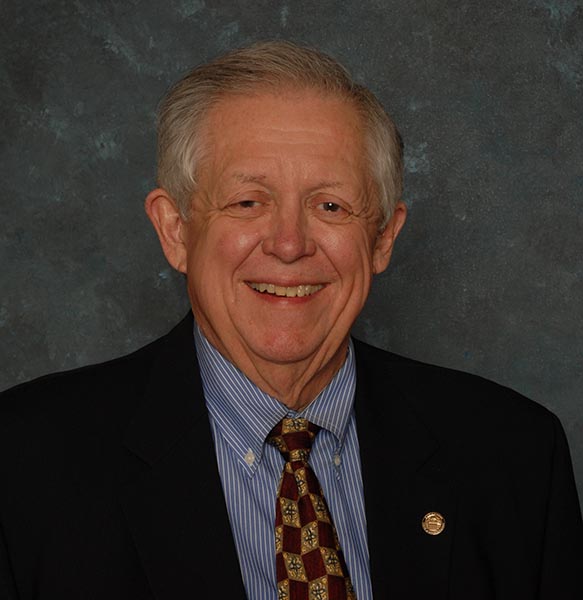
State Rep. David Wheeler passed away on Wednesday at the age of 72, Yellowhammer News reported. Wheeler was running unopposed in his bid for a second term representing House District 47. A Vestavia Hills resident, Wheeler was a retired Alabama Power employee and a longtime member of the University of Montevallo board of trustees. Wheeler was in the final year of his first term in the Legislature. Gov. Kay Ivey issued a statement following the news. “Rep. Wheeler was a good man, devoted to his values, his community, and our entire state. He was taken from us too soon, and I know he will be missed by all, especially by the people he served in Jefferson County. His wife Diane and all of his loved ones are in my prayers.” “The people of District 47 and all of Alabama have lost a devoted servant, and I’ve lost a good friend,” House Speaker Mac McCutcheon said in a statement. “It was rare that David came to the microphone to speak on legislation, but when he did, his words carried weight. I’ll miss him, and so will the members of the House.” House Majority Leader Nathaniel Ledbetter issued a public statement on behalf of the House Republican Caucus expressing sadness over Wheeler’s passing. “Every member of the House Republican Caucus is shocked and saddened by the sudden passing of our colleague, Rep. David Wheeler, and his loss is deeply felt by all who knew him,” stated Ledbetter. “A kind and jovial man with a broad smile and firm handshake for those he encountered, Rep. Wheeler was dedicated to his district and worked hard to represent the constituents who elected him. He stood firm in his conservative beliefs and understood that the moral character and values unique to Alabamians are what make our state such a special place to live, work, worship, and raise a family,” added Ledbetter. “Alabama has lost a statesman, and those of us who were fortunate to work alongside him have lost a good and trusted friend.” Ivey has also directed flags to be flown at half-staff immediately and through sunset tomorrow, March 10, 2022.
Alabama seeks to remove racist language from Constitution
Alabama lawmakers have begun a process to remove racist language from the state’s 121-year-old Constitution. The Alabama House of Representatives on Thursday voted 94-0 for the resolution by Rep. Merika Coleman that streamlines the massive state document and removes lingering Jim Crow language. The legislation now moves to the Alabama Senate. If approved, it would go before voters in November. The proposal would strip language on segregated schools, poll taxes, and language that allowed a brutal convict lease system that sold Black men, often arrested under questionable circumstances, into forced labor. While those provisions have largely been invalidated by court rulings, the vestiges of Jim Crow remain in the state’s chief governing document, such as the fight to maintain segregated schools. The pending proposal also reorganizes the massive, sprawling document that has nearly 1,000 constitutional amendments to try to make it more user-friendly. The process began in 2020 after voters approved an amendment authorizing the streamlining of the state governing document. The proposal has bipartisan support. “For several years, we’ve been working on cleaning up the Constitution and the wording in it, and this will move us forward with helping to accomplish that. There is some racist terminology in there, and this is going to address some of that,” House Speaker Mac McCutcheon said. Proponents in Alabama are hopeful this effort will succeed where others have failed. Voters in the mostly white, conservative state had rejected similar proposals twice since 2000 after they became intertwined with school funding issues. State voters in 2000 did vote to remove a ban on interracial marriages, but about 40% of voters cast ballots to keep the interracial marriage ban in the Constitution. Republished with the permission of the Associated Press.
House to vote on allowing concealed handguns without permit

The Alabama House of Representatives could vote soon on legislation to do away with the requirement for a person to get a permit to carry a concealed handgun in public. House Speaker Mac McCutcheon said there is a good chance representatives will vote on the bill as early as Tuesday. House Republicans, who hold a lopsided majority in the chamber, have named the legislation as a priority for the year. The bill would do away with permits for people who carry a handgun under their clothes or in a purse or bag when they go in public. It would also do away with the current requirement for people without concealed carry permits to keep handguns unloaded and secured when driving. The bill has been championed by gun-rights groups who argue that people shouldn’t have to get a permit, which requires paying a fee, to carry a handgun they legally own. State sheriffs and other law enforcement officials have opposed the legislation, arguing that the permits provide a crucial tool to combat crime and enhance public safety. There are 21 states that allow concealed weapons in public without a permit, according to Stateline, an initiative of the Pew Charitable Trust. If approved in the House, the bill will then go to the Senate. Republished with the permission of the Associated Press.
Alabama appeals ruling ordering new congressional districts
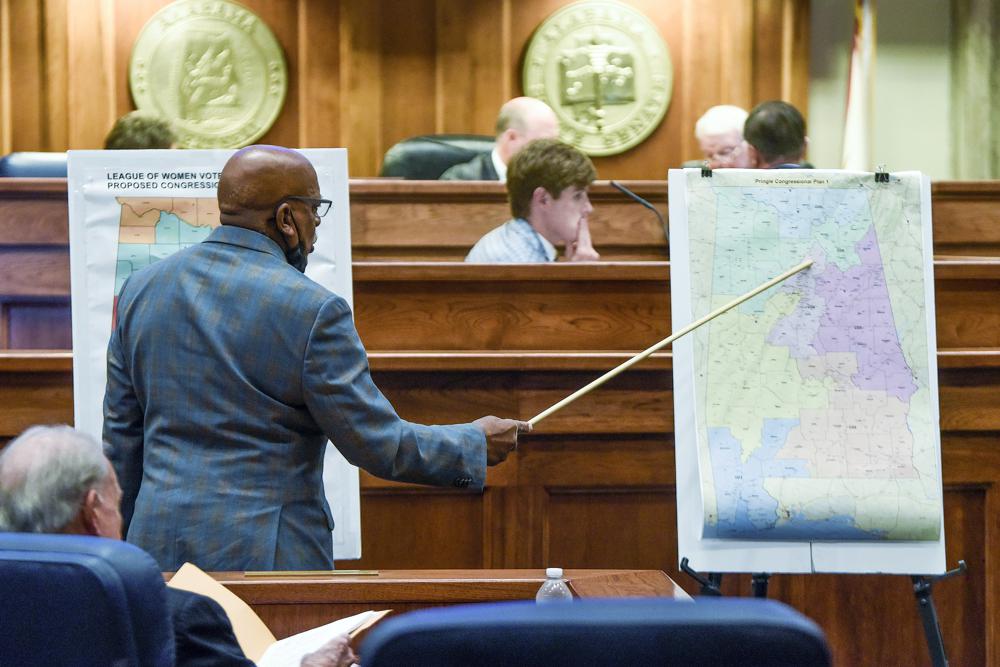
Alabama on Tuesday began appealing a federal court ruling that ordered the state to draw new congressional districts, including a second district with a substantial number of minority voters. The Alabama attorney general’s office filed a notice of appeal to the judges’ order that blocked the current map from being used in the upcoming 2022 elections. The state argued similar maps had been in use for decades with court approval, and the ruling is problematic with the closeness of May primaries. The state also asked the judges to stay their order during the appeals process. “And roughly two months before absentee voting begins, it is clear that the Court’s order will cause irreparable harm to Alabama, its aspiring congressional representatives, and the voters they seek to represent,” lawyers for the state wrote in the emergency motion. The state asked for a quick ruling, and a judge ordered attorneys for voters who filed the initial lawsuit to submit a response by Thursday night. A three-judge panel on Monday issued a preliminary injunction that blocked Alabama from using its current map that created one heavily Black district and six heavily white districts. “Black voters have less opportunity than other Alabamians to elect candidates of their choice to Congress,” judges wrote in the ruling. The judges wrote that any remedial plan will need to include two districts in which Black voters “either comprise a voting-age majority or something quite close to it.” The ruling was a victory for Democrats who had argued the lines pack many Black voters into a single district and limits the ability of Black voters elsewhere to influence elections because they live in overwhelmingly white Republican districts. House Minority Leader Anthony Daniels said districts lines should reflect the racial and political diversity of the state. Alabama’s congressional delegation consists of one Black Democrat and six white Republicans. Black people make up about 27% of Alabama’s population. “Well, for me, a state that is approximately 40% Democrat with only one representative out of seven, I mean, that speaks for itself,” he said. Daniels suggested it would be best for the court to go ahead and draw the districts. “I suspect this will probably make it up to the Supreme Court at some point, but I think that this is going to set the tone for the nation and addressing redistricting long-term,” he said. The three judges that issued the ruling consisted of one judge appointed by former President Bill Clinton — Senior U.S. Circuit Judge Stanley Marcus and two judges appointed by former President Donald Trump — U.S. District Judges Anna Manasco and U.S. District Judge Terry Moorer. The Alabama House speaker told reporters Tuesday that legislative leaders are discussing how to proceed. “Well, we’re meeting with legal, and we’re finding out what our options are, and at this point, we don’t know we just got to wait and see,” Republican House Speaker Mac McCutcheon of Monrovia told reporters. McCutcheon said the “reapportionment committee is ready to go to work” if needed. The state faces a tight timeline. Party primaries are in May. Republished with the permission of the Associated Press.
Steve Flowers: Will gambling be addressed in 2022?

As the final regular legislative session of the quadrennium evolves, it is apparent that the legislature will not touch any substantive or controversial issues, but simply pass the budgets and go home to campaign. It is election year in the Heart of Dixie. If legislators are listening to their constituents, they are hearing one thing – Alabamians want their legislators to allow them the right to vote on receiving their fair share of the money from gambling in Alabama. They are simply sick and tired of their money going to Georgia, Mississippi, Florida, and Tennessee while Alabamians are paying for those states’ schools, roads, and bridges. You can bet your bottom dollar that if a clean lottery/sports betting referendum were to be placed on this November’s ballot, it would pass in a New York minute. Even the most conservative folks in our state would vote for it, if for only one reason – they want their money to stay in state. Every time there is one of these high-dollar Powerball national drawings, every convenience store on our border in the aforementioned bordering sister states’ parking lots are jammed with Alabamians clamoring to buy a lottery ticket. Governor Kay Ivey has had a very accomplished five-year reign as Governor. The Rebuild Alabama road, bridge, and infrastructure program was big and much needed. Most of her successes have been housekeeping chores that required a governor, who was willing to put the state first and get these necessary projects accomplished instead of kicking the can down the road like some of her predecessors. However, these accomplishments will not give her a legacy issue that 50 to 100 years from now folks can point to and say Kay Ivey has a legacy. The legacy awaiting Governor Ivey is the creation of a Constitutional Amendment that garners the tremendous amount of money spent on gambling in Alabama and also a Gambling Regulatory Commission to monitor and police gaming. You are talking about some real money for Alabama. Conservative estimates are $700 million a year to the state. In addition, there would be 12,000 new jobs. The legislature and governor by themselves cannot achieve this reaping of the gambling gold mine. It would have to be approved by you – the voters of Alabama – in a Constitutional Amendment. If polling is correct, it would pass 65-35. With it being a constitutional amendment, it needs a three-fifths vote in the legislature to place the initiative on the ballot. The issue was discussed, extensively, and voted on in the 2021 session. It passed in the Senate but never was never put to a vote in the House. The Senate would pass it again. There were 23 votes for the Constitutional Amendment and only 21 were needed for passage. There needs to be 63 votes in the 105 member House to place the amendment on the ballot in this year’s November General Election. Therefore, the question is will it be placed on the ballot this year for Alabamians to vote to reap this financial bonanza? In order to pass the Constitutional Amendment to allow Alabamians to vote on a lottery and expanded gambling, Governor Ivey probably will need to weigh in with both feet and promote the issue in a Special Session. Because it is an election year, the legislature probably will not want to deal with the issue until after the elections. The primary election is May 24. The current regular session will end in April, so gambling probably will not be dealt with in this regular session. Therefore, the best way to get the amendment on the ballot is a special session during the month of June because it has to be done by the first of July to get on the November ballot. However, with most legislators being unopposed they may take the bull by the horns and pass the constitutional amendment for you to vote on in November without the need for a special session. In observing the legislature, it is bittersweet seeing Speaker of the House Mac McCutcheon presiding over probably his last session as Speaker. He has done an excellent job as Speaker. He is a kind, even-tempered gentleman, who exudes integrity. He is decisive and fair, and you can tell he is a man of faith who truly cares about the House members, both Republicans, and Democrats. See you next week. Steve Flowers is Alabama’s leading political columnist. His weekly column appears in over 60 Alabama newspapers. He served 16 years in the state legislature. Steve may be reached at www.steveflowers.us.
Negotiations, disagreements on use of state virus funds
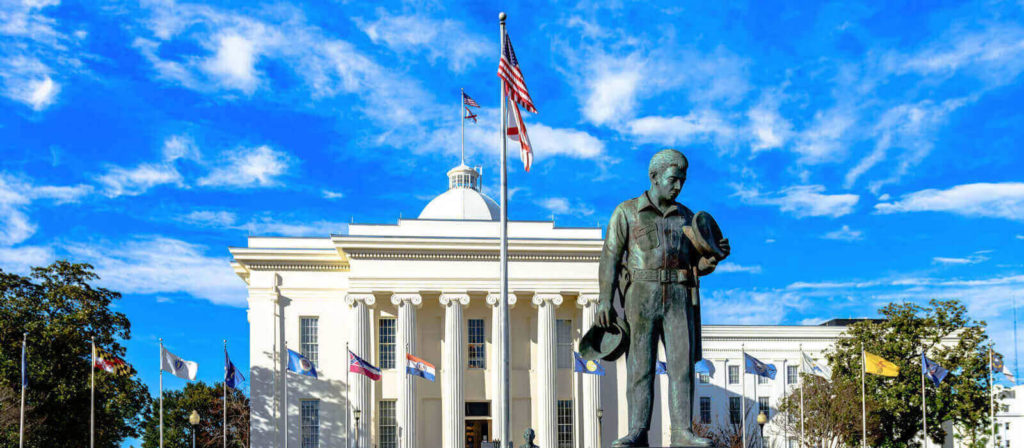
Alabama lawmakers, attempting to decide how to spend more than $500 million in pandemic relief funds, on Thursday generally agreed on funding broadband and water and sewer projects but disagreed about whether to steer some money to state parks. Lawmakers anticipate meeting as soon as next week in a special session called by Gov. Kay Ivey to discuss how to use the remaining $580 million from the state’s first installment from the American Rescue Plan. “You can imagine with this kind of money everybody’s at the trough,” said Sen. Del Marsh, a Republican from Anniston. Marsh said he expects the special session to happen next week, while other lawmakers only said it was a possibility. Senate President Pro Tem Greg Reed said there have been requests “on a plethora of different topics” for using the remaining $580 million. “We’re trying to make sure that we isolate on those things that have the biggest investment benefit for the future,” said Reed, a Republican from Jasper. The massive $1.9 trillion American Rescue Plan provided aid for state, local and tribal governments to help shore up their finances, pay the ongoing costs of fighting the coronavirus pandemic and invest in longer-term projects to strengthen communities. Alabama received the first half of its $2.12 billion allotment in June. The state has $580 million remaining after steering $80 million to hospitals and nursing homes and $400 million to a controversial prison construction plan. Republicans and Democrats have expressed general support for using the money for broadband, water, and sewer infrastructure and relief to health care providers, although the specifics of the plans remain under discussion. But using the money for state parks emerged as a subject of contention on Thursday. House Speaker Mac McCutcheon and other legislative leaders said one of the ideas under discussion is using a portion of the money for improvements at state parks and historic sites. Assistant House Minority Leader Merika Coleman said House Democrats had some concerns about that proposal. “What we don’t want to happen with this money is for people to use it as an opportunity for pet projects because it is an election year. The money should go to the entities that need it the most, that have been on the frontlines of this pandemic for the past two years,” said Coleman, a Democrat from Pleasant Grove. Senate Minority Leader Bobby Singleton said he thought money for parks could wait until the next round of funding when the state receives its second $1 billion allocation. “We need to deal with the pandemic,” said Singleton, a Democrat from Greensboro. “I would love to see more things that are more sustainable with this pandemic and being able to help people.” When asked about the idea, some members noted the importance of state parks to local tourism. Sen. Tim Melson, a Republican from Florence, said Joe Wheeler Park hasn’t been repaired after being struck by a tornado. “It needs to be done so we can get it back to functionality, and we can get tourism back in there,” Melson said. Lawmakers in New Mexico earmarked $14.5 million of that state’s money for state parks and historic sites. Sen. Greg Albritton, who chairs the Senate General Fund budget committee, said regarding the question of how to spend the relief money, “most everything you can dream of has been thought of and looked at.” “We’re deep into it. I thought we were past the yelling stage, but I’m not sure we completely are yet,” Albritton, a Republican from Atmore, said when asked about negotiations. Lawmakers expect to allocate the $580 million this session and leave decisions on the second $1 billion installment until the state receives it. Republished with the permission of the Associated Press.
Alabama lawmakers begin session amid COVID surge, elections
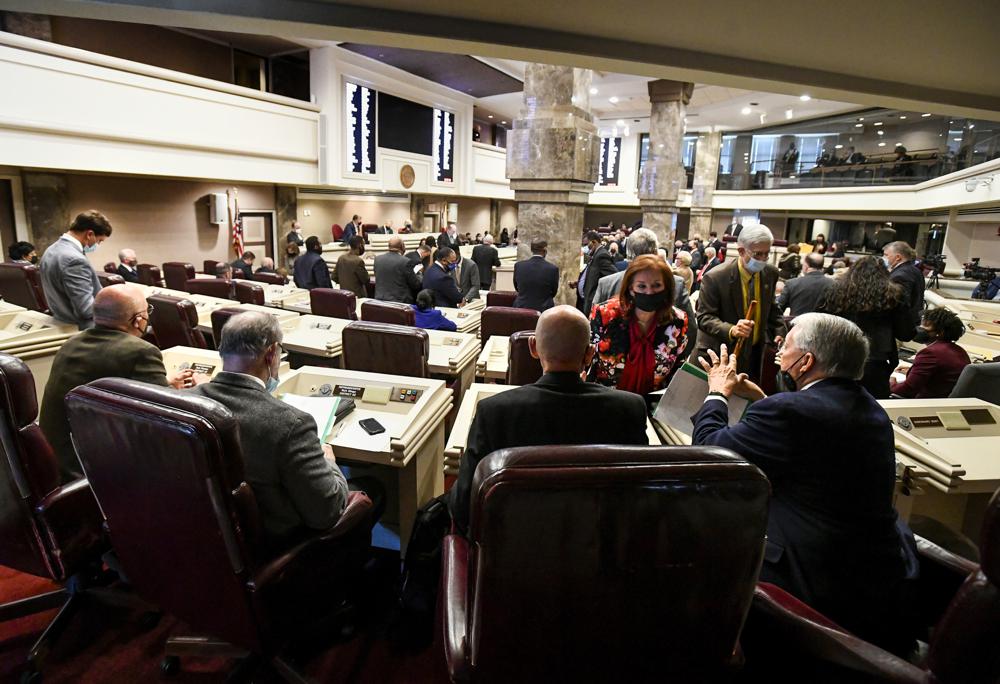
Alabama lawmakers returned to Montgomery on Tuesday to begin the 2022 legislative session against a backdrop of rising coronavirus cases and looming elections, faced with major decisions, including how to use the state’s remaining pandemic relief funds. Congress allocated $2.12 billion for Alabama through the American Rescue Plan. The state received the first half in June and has $580 million remaining after steering $80 million to hospitals and nursing homes and $400 million on a controversial prison construction plan. A key topic for the session will be how to use those remaining pandemic dollars. “We’re going to be looking at major priorities such as water and sewer grants for the state. Broadband will be an issue and health care,” House Speaker Mac McCutcheon said. Senate President Pro Tem Greg Reed agreed those will be funding priorities and said it is important lawmakers spend the money on projects that will have lasting effects. “We talked about water and sewer projects. These are things that we can spend the resources on that are beneficial for the people of Alabama for many, many years in the future,” Reed said. House Minority Leader Anthony Daniels, a Democrat from Huntsville, said that in addition to needs like broadband, Democrats would like to see health care, child care, affordable housing, and pandemic recovery for businesses addressed. “COVID-19 is not going away. In fact, the numbers are at their highest right now with this new variant,” said Daniels, who just recovered from his second bout with the coronavirus. “We just have to think through where our investments will be more well-spent and yield the returns that we need long term.” Key lawmakers said there are discussions with Gov. Kay Ivey about holding a special session to focus on the pandemic relief funds. A spokesperson for Ivey said last week that the governor “wants this to be an early priority for the Legislature.” Unlike previous years, state budgets are seeing significant growth because of increases in sales and income tax collections. Lawmakers are expected to approve a pay raise for teachers and state employees. Key lawmakers, including Sen. Greg Albritton, chairman of the Senate General Fund budget committee, said raises up to 4% are under discussion for both teachers and state employees. Lawmakers are coming to the Statehouse as Alabama experiences a record jump in COVID-19 cases fueled by the highly contagious omicron variant. The Statehouse is open to the public, but some safety precautions have been put in place. The 105-member Alabama House of Representatives is requiring masks in common areas such as hallways. Seating will be limited at Ivey’s State of the State address. Representatives can choose to vote from an overflow room if they feel unsafe in the crowded chamber. House Republicans this year are pushing what they have dubbed the “Standing Tall for Alabama” agenda, which includes legislation to do away with the requirement to get a permit to carry a concealed handgun in public. The backing increases the chances of approval for the proposal that has failed for several years in Montgomery. However, the proposal continues to face opposition from state sheriffs who say it will undermine public safety. The House GOP agenda also includes anti-critical race theory legislation and the creation of a felony crime for assaulting a first-responder. Daniels called the GOP agenda a “waste of time” as the state continues to deal with the ongoing COVID-19 pandemic. Lawmakers face primaries on May 24. An election-year session traditionally brings a flurry of legislation and resolutions that lawmakers believe will appeal to their voters. However, legislators also will feel pressure to finish up the session quickly in order to hit the campaign trail. Republished with the permission of the Associated Press.
Kay Ivey and Condoleezza Rice release Alabama Innovation Commission recommendations to boost innovation, entrepreneurship
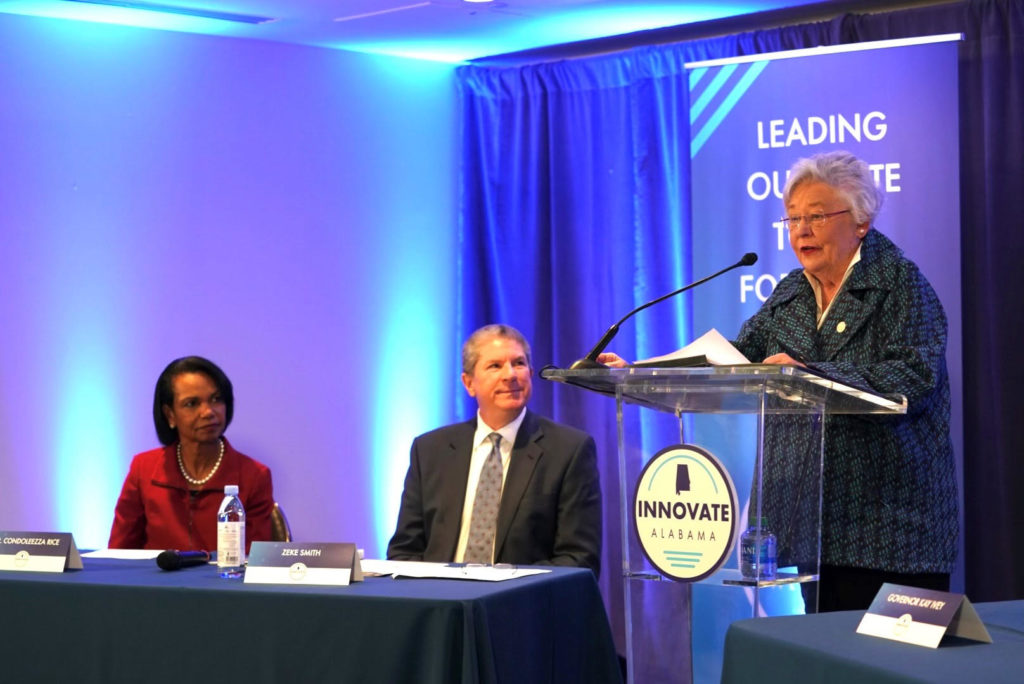
Governor Kay Ivey and Condoleezza Rice, 66th U.S. secretary of state and director of the Hoover Institution, joined state leaders on Tuesday to share the Alabama Innovation Commission’s policy recommendations and announce the Alabama Innovation Corporation board of directors. Governor Ivey established the commission and its advisory council in July 2020. “The Alabama Innovation Commission has done incredible work, and I’m excited to see how we as a state can implement smart policies that will foster innovation and develop a talented workforce for the future,” stated Governor Ivey. “I’m inspired by the promising growth for Alabama’s economy, and I look forward to working with the Alabama Legislature and the Alabama Innovation Corporation to help Alabama reach new heights.” Alabama Innovation Commission (Innovate Alabama) is the state’s first commission focused on entrepreneurship, technology, and innovation. The commission brings together private-sector experts and policymakers to develop forward-thinking policies that work to create a strong economy to help Alabama remain competitive in the 21st century. Ivey commented on Twitter, “Alabama. Where you can dream big, play hard, and live comfortably. We’re building a better state – a place where equitable opportunity exists. Now, we have a playbook to take us there.” The commission, led by Alabama Finance Director Bill Poole and state Sen. Greg Reed, includes a six-member advisory council of innovation leaders in Alabama and those outside the state who have strong ties to Alabama. The advisory council, led by Alabama Power Executive Vice President Zeke Smith, included innovation leaders from across the nation, and a partnership with Hoover Institution research scholars led by Director Rice, to support the commission’s work. “I’m proud to be a daughter of Alabama and believe that Alabama’s education, job training, and workforce development can be second to none. This state is poised for an even greater future here, and we are excited to be a part of that,” said Dr. Rice. “The Hoover Institution will continue to partner with the state and the Alabama Innovation Corporation to support this initiative as Alabama continues to push for strengthening its economy so life can be good for all Alabamians.” State Finance Director and Innovation Commission Chair Bill Poole added, “I’m proud of the commission’s work and know that its efforts will have a tremendous impact on our state. The ideas, recommendations, and strategies in this report give us a path forward for how Alabama can be a leader in the fields of innovation, technology, and research. I look forward to seeing partners from private, and public sectors continue working together through the Innovation Corporation to grow our economy.” Members of the Innovation Corporation board of directors are: Governor Kay Ivey (ex-officio) Alabama Speaker of the House Mac McCutcheon (ex-officio) Senate President Pro Tempore Greg Reed (ex-officio) House Minority Leader Anthony Daniels (ex-officio) Senator Minority Leader Bobby Singleton (ex-officio) Rich Bielen – President and CEO, Protective Life Corporation (at-large director) Dr. Michael Chambers – Assistant Vice President for Research Innovation, University of South Alabama (at-large director) Abe Harper – President, Harper Technologies (at-large director) David King – President, Dynetics (at-large director) Bill Poole – Director, Alabama Department of Finance (chairman) Britney Summerville – Founder, Birmingham Bound (at-large director) The policy recommendations and findings detailed five areas that address current challenges. Entrepreneurship and Access to Capital: Identifying and supporting opportunities to fuel entrepreneurial development at every stage of business growth. Talent Attraction and Retention: Recruiting and retaining a workforce with the skills, knowledge and credentials necessary to create innovation ecosystems throughout the state. Increasing Commercialization: Fostering an environment that increases commercialization activities, research and development efforts and supports the state’s economy as a whole. Bridging Digital and Economic Divides: Leveraging initiatives and resources that support growth throughout Alabama. Knowledge Economy: Developing a skilled workforce ready to meet the demands of the future. “These policy recommendations are a culmination of 18 months of hard work, time, and effort from a variety of different highly qualified individuals and organizations working together to chart a strong path forward for our state’s economy, and I couldn’t be any happier with the product that the commission was able to produce,” said Sen. Reed. “This report outlines a road map to spurring entrepreneurship, startup businesses, and innovation in our state, and I look forward to seeing the impact it will have on the future of Alabama.”
Steve Flowers: Incumbency prevails in 2022 State House races

Folks, believe it or not, we are closing in on six months before next year’s election year. The primary election is set for May 24, 2022. In Alabama, all our major constitutional officers are on the ballot next year. The governor’s office is the premier race in the state, and that coveted and powerful post is set for its four-year quadrennial run. Therefore, this big political year is referred to as the gubernatorial year. Those of us who follow Alabama politics have been salivating with anticipation for a cavalcade of great races. However, the power of incumbency has devasted the big year into a yawn. All the major state offices are held by popular incumbents, who are either running unopposed or have minimal opposition. The consolation prize was that there would be the legislative races. After all, this is where the real power in the state rests. You can simply look at where the special interest and PAC money is spent to verify that fact. However, the omnipotent power of incumbency has also encroached on those races. The Alabama House of Representatives has 105 members. There are 77 Republicans and 28 Democrats. The large majority of incumbents are running for reelection – both Republicans and Democrats. The overwhelming majority of these incumbents will have no opposition. However, in the House, there will be some major changes in leadership because of retirement or moving on to new posts. Speaker of the House Mac McCutcheon is not running for reelection. This has created an interesting and spirited race within the Republican Caucus ranks for Speaker. In addition, Victor Gaston of Mobile, who is Speaker Pro Tem, is also retiring. Bill Poole of Tuscaloosa, who chaired the powerful House Ways and Means Education Budget Committee, has left the House to be the State Finance Director. House Rules Committee Chairman Mike Jones of Andalusia is running for the open Senate seat of retiring Senator Jimmy Holley. Two of the freshman House members are running for statewide office. Wes Allen of Troy is running for Secretary of State, and Andrew Sorrell of Tuscumbia is running for State Auditor. In addition, Connie Rowe of Jasper is leaving the House to become an administrative assistant to Lt. Gov. Will Ainsworth. Some of the veteran House members who are choosing to hang up their legislative cleats include Howard Sanderford of Huntsville, Mike Ball of Huntsville, K.L. Brown of Jacksonville, Kerry Rich of Marshall, Allen Farley of Jefferson, Harry Shiver of Baldwin, Mike Holmes of Elmore, and Becky Nordgren of Etowah. The most noteworthy retiree may be Representative Steve McMillan of Baldwin County, who is retiring after serving close to 43 years in the House. Steve has been a quiet yet very effective voice for the people of Baldwin County. They all will be missed. Some of the high profile and powerful members of the House, who will return for another four years with no or token opposition, are Steve Clouse of Ozark, Nathaniel Ledbetter of Dekalb County, and Danny Garrett, Jim Carns, David Wheeler, and David Faulkner of Jefferson. Danny Garrett has ascended to Chairman of the House Ways and Means Education. Other leaders returning are Chris Pringle, Reed Ingram, Randall Shedd, Tracy Estes, Chris Sells, David Standridge, Ginny Shaver, Jim Hill, Alan Baker, Joe Lovvorn, Chris Blackshear, Kyle South, Paul Lee, Jeff Sorrells, Rhett Marques, Steve Hurst, Joe Faust, and Margie Wilcox. The Democratic leadership will remain intact. There is an illustrious array of House Democratic leaders, including Anthony Daniels, Chris England, Laura Hall, Peb Warren, Barbara Boyd, A.J. McCampbell, Berry Forte, Dexter Grimsley, Thomas Jackson, Kevin Lawrence, Mary Moore, Juandalynn Givan, and veteran John Rogers. Two of the Democratic House veterans from Jefferson County, Louise Alexander and Merika Coleman, are both running for an open Jefferson County Senate Seat, leaving both their House seats up for grabs. There may be an increase in the number of females in the House of Representatives. It has already begun with the election of Cynthia Almond of Tuscaloosa, who was elected without opposition to replace Bill Poole. In addition, Patrice Penni McClammy won the Montgomery District 76 seat of her late father, Thad McClammy. She won with no opposition. See you next week. Steve Flowers is Alabama’s leading political columnist. His weekly column appears in over 60 Alabama papers. He served 16 years in the state legislature. Steve may be reached at www.steveflowers.us.


